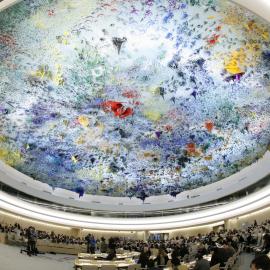To the Editor:
Charles Kupchan's contribution to the debate over how best to promote international cooperation in a globalized world ("Minor League, Major Problems," November/December 2008) is welcome. Unfortunately, his criticisms of proposals to create a concert of democracies miss the mark.
A concert of democracies would not be, as Kupchan describes it, "a global forum that denies autocracies a say in world affairs." That formulation not only misstates the purpose of such a concert, it also rests on an unpersuasive binary logic: democracies can either work together or work with autocracies. But democracies can do both at the same time. All democracies have extensive public and private ties to all major authoritarian states, and this is not going to change. Indeed, an international community with overlapping, crosscutting political networks is likely to be far more durable than one with only a few points of overlap, because the former would blur sharp divisions and create opportunities to build new coalitions.
What a concert of democracies would offer would be an opportunity to deepen and broaden cooperation among democratic states. As Kupchan acknowledges, NATO, the EU, and U.S.-Japanese security ties show what democratic cooperation can achieve. But these institutions are geographically confined, with little scope for cooperation among them. And all of them leave out emerging democratic powers, such as Brazil, India, and South Africa. Brussels, Tokyo, and Washington should work to embrace these new democratic partners rather than foolishly holding them apart. Far from presenting these countries with a "take-it-or-leave-it offer," a concert of democracies would give them a forum to help shape the rules of world politics and the behavior of other democracies.
Will democratic cooperation come automatically? No. Kupchan is right that "democracies often have diverging interests." But a concert of democracies would not depend on the mirage of common interests to succeed. What distinguishes democracies from autocracies is their proven track record of working together to overcome their differences. Democracies work well together because their shared commitment to the rule of law and the consent of the governed enables them to trust one another in ways that democracies and autocracies do not.
The problem of divergent interests, moreover, poses a far greater threat to Kupchan's preferred form of international cooperation, "a purposeful concert of great powers." Democracies and autocracies disagree not just on material interests but also on the values that should be embedded in the international system. Even if those differences could be wished away, as Kupchan likes to do, the world in which a few great powers could impose their will on the many is long gone.
Just as it took time for the European Coal and Steel Community to become the European Union, it will take time to forge an effective concert of democracies. The legacy of the past eight years has only made the task harder by diminishing goodwill for the United States around the world.
But before despairing over the task at hand, it is worth asking if the world can afford not to have democratic countries deepen their cooperation. The failure to bring democracies together would not mean sustaining an acceptable status quo; it would mean continued drift and division in world politics and inadequate and ineffective responses to the many problems that now transcend international borders. If democracies do not press forward together, they will face greater troubles in the future. That is the real choice.
JAMES M. LINDSAY
Director, Robert S. Strauss Center for International Security and Law, and Tom Slick Chair for International Affairs, Lyndon B. Johnson School of Public Affairs, University of Texas at Austin
